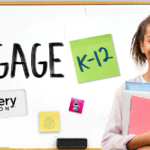My wife Tina and I launched the company, The Social Express, back in 2010 with a single focused mission and vision statement which was “to help people live better lives.” The purpose of creating the company was very personal to us. In 2001, our identical twin boys were both diagnosed with autism. Tina and I quickly learned that social and emotional learning was going to become a top priority for our sons, if they were to live independent lives.
We weren’t satisfied by the tools being provided to us by the schools to help build our boys social emotional skills – or what we now call their EQ (EQ=emotional quotient versus the more commonly known IQ, or Intellectual Quotient). We knew that this EQ was the core deficiency for our boys, and we also knew that there were thousands of other children (and their parents) who were facing the same or similar challenges. With our vision and mission in our hearts to guide us, my wife, and I worked together with an incredible team of professionals to create a real EQ instructional program that would be engaging and teach students important skills to be successful in life. The result was The Social Express. Our boys were not only the inspiration; they were beta testers, who ultimately gave it big thumbs up just by their own increased awareness and overall EQ.
Today, The Social Express includes 81 realistic scenarios which serve as simulations for exploring and understanding peer to peer interactions while maintaining a fun engaging environment with animation and lots of interactivity.
When we saw that Social Express was becoming a big hit, we kept charging forward – today it is joined by two other programs in our suite. The first, Teen Career Path, which was funded by a grant by the National Science Foundation, focuses on job and career exploration to support transition programs. It is really designed with teens in mind, having a modern gaming format that keeps students engaged and motivated. The second program, Cool School, takes EQ to the next level with a research-based program to teach all students, using interactive video and activities, how to identify different kinds of bullying (verbal, physical, etc.). Cool School shows students how their behaviors and actions impact the people and social climate around them.
So the quest for us is still the same – “to help people live better lives” and each of our programs works on reaching that goal through social learning made easier by the power of technology.
Today’s teachers are inundated with so many things they have to manage – rigorous curriculum standards, increased attention to assessments, and school safety, just to name a few. Practically speaking at the top of that list is managing behavioral problems which need to be dealt with first and foremost if any teaching and learning is ever going to happen. Now with the growth of the inclusion model to provide students with special needs the least restrictive environment (LRE), general education teachers now have students in their classrooms who need special attention. Teachers are challenged on a daily basis with figuring out how to provide equitable time and attention for the special-needs students as well as their neuro-typical students.
With all these demands on their time, teachers have very little time to prepare lesson plans that address social-emotional goals. Our platform of programs enables teachers to have turnkey lesson plans that align with IEP’s and transition plan goals. We utilize best practices of Universal Design for Learning (UDL) to ensure that we can help students with all different types of learning challenges to benefit from our program. For example, we utilize subtitles and visual aids, and corrective feedback as UDL options across the platform. Our goal is to meet the needs of all students – general ed, or special ed, in order to ensure that our program embraces equity in schools.
I receive emails from educators around the world, anywhere from Boston to Dubai, telling me their success stories with their kiddos. Fulfilling our mission statement is an amazing feeling, and I am proud to say that we are meeting our goals.
For instance, I remember reading an email from a teacher in North Carolina, who told me that one of her students was able to attend his 6th grade trip to Washington DC because he learned essential coping strategies and self-regulation from The Social Express. He was able to be away from his mom and have a great time with his peers. To me, that makes it all worthwhile!
We believe that by raising people’s EQ, we can really impact the world. Schools are often solely focused on IQ, but given the rise of issues with student safety, it is clear that EQ is just as important as IQ. School leaders are recognizing this as well, hence the increase in interest for social emotional learning (SEL) programs.
Finally, I am so proud of our ongoing research and development, drawing up expertise and empirical data to continue to build and develop our programs to meet the needs of all students and teachers. We pride ourselves on students learning to solve problems, and see the best way to manage situations in a safe and private environment. Our research shows a direct transference to daily life.
The biggest challenge schools face today is the incredibly high attrition rate of teachers, especially in the area of special education. Recently, I was told by a Special Education Director that in the next 10 years 50% of all special education teachers will be retiring. This concerns me greatly as I know that schools will face the problem of how to service their students and maintain compliance with IDEA.
A related problem that this causes is the burgeoning growth in the amount of inclusion students. Now general education teachers will have to be retrained to understand how to accommodate individual special needs, as well as manage time and resources accordingly. Schools will need to have extra budget for teacher assistants in every room to manage all these individual needs and IEPs. I just know that it will be hard to maintain quality in individualized instruction, especially given that budgets are always shrinking. Schools will do their best by focusing on academics and IQ, but what about EQ? The likelihood is that students will just be passed from grade to grade because they can function academically (IQ), but that doesn’t mean that they are emotionally prepared with (EQ) to be independent and successful in life.
Educational Equity to me, means that we are making the same opportunities available to all students to learn and feel like school is a place that they want to be and not a place that they have to be. There is so much disparity today between districts and schools within districts; it would be nice to see that somehow we can level the playing field for everybody.
Visit The Social Express website
The American Consortium for Equity in Education, publisher of the "Equity & Access" journal, celebrates and connects the educators, associations, community partners and industry leaders who are working to solve problems and create a more equitable environment for historically underserved pre K-12 students throughout the United States.
- American Consortium for Equity in Educationhttps://ace-ed.org/author/admin/
- American Consortium for Equity in Educationhttps://ace-ed.org/author/admin/April 23, 2025
- American Consortium for Equity in Educationhttps://ace-ed.org/author/admin/
- American Consortium for Equity in Educationhttps://ace-ed.org/author/admin/







